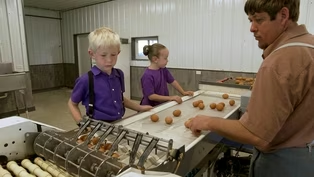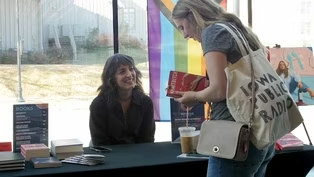
Deafinitely Dogs!
Clip: Season 2 Episode 208 | 5m 50sVideo has Closed Captions
Hearing dogs are trained to alert the deaf and hard of hearing to sounds that are important.
Hearing dogs are trained to alert the deaf and hard of hearing to sounds that are important for their safety and independence.
Problems playing video? | Closed Captioning Feedback
Problems playing video? | Closed Captioning Feedback
Iowa Life is a local public television program presented by Iowa PBS

Deafinitely Dogs!
Clip: Season 2 Episode 208 | 5m 50sVideo has Closed Captions
Hearing dogs are trained to alert the deaf and hard of hearing to sounds that are important for their safety and independence.
Problems playing video? | Closed Captioning Feedback
How to Watch Iowa Life
Iowa Life is available to stream on pbs.org and the free PBS App, available on iPhone, Apple TV, Android TV, Android smartphones, Amazon Fire TV, Amazon Fire Tablet, Roku, Samsung Smart TV, and Vizio.
Providing Support for PBS.org
Learn Moreabout PBS online sponsorship♪♪ [Dog Trainer] I want you to practice now on saying no because sometimes, you've got to think about it, the people that we serve, they may not be able to hear a person ask if they can pet their dog or we might have someone with PTSD who really doesn't want anybody touching their dog.
And so, we want the dogs to be able to have somebody approach them and say hey, can I pet your dog?
And you are like, no thank you, not right now.
Or you can just say no and keep walking.
[Nebbe] Support animals such as service dogs are becoming increasingly common.
Trained with specialized skills, service dogs are frequently employed to help with disability support for issues such as mobility or PTSD.
But, that's only the beginning of what they're capable of.
[Lorette Vanourny] We're Deafinitely Dogs, obviously, D-e-a-f for Deafinitely.
We started out in the hearing dog world.
But their technology is so good, it has just gotten better and better and better.
So, we don't get as many requests for hearing dogs as we do for PTSD.
[Sherry Steine-Ross] Yes, there's cochlear implants, there's hearing aids, but you take all that out at night and you can no longer hear.
Think about how scary that is.
Someone could be banging down your door and you wouldn't hear it.
So, you have the dog to alert you to your sounds again.
♪♪ [Lorette Vanourny] So, our hearing dogs are those dogs that can keep playing the game, they can come alert you and take you to the sound and that is really reinforcing to them.
Like hey, I heard it, I'm going to come get you.
I'm going to take you to it.
(alarm sounds) [Bridget] Oh, good boy!
[Bridget Eischeid] Rudy is my hearing alert service dog.
I actually have what is called reverse slope hearing loss.
It's where I hear high pitches really well, but low tones like men's voices or something are more difficult for me to hear.
He will use his nose to nudge me and let me know that that sound is happening.
And there's certain sounds, like my first name, that I can even say show me and he would go to the person that is saying the name.
He definitely is my best friend.
He's my soul dog.
I've loved every dog that has ever been in my life, but Rudy is just very, very special.
[Nebbe] Rudy is a Deafinitely Dogs graduate.
Raised and trained in Cedar Rapids, Rudy now lives with Bridget, a Kansas City area teacher and track coach originally from northwestern Iowa.
While not as common, hearing alert service dogs like Rudy are still out there keeping their handlers safe and alerting them to sounds that might be missed.
[Bridget Eischeid] So, actually I was just scrolling through social media and something popped up about a hearing alert service dog.
And I literally was like, what?
That's a thing?
And then I came across Deafinitely Dogs on the Internet and I contacted them.
And I went to Cedar Rapids and that is when I met Rudy.
And honestly, it was love at first sight I think for both of us.
[Sherry Steine-Ross] So, the idea of a service dog is to enable you, not enable your disability.
So, we want the dogs to be able to enhance their lives and give them more independence, not make them more dependent for things that they can already do for themselves.
[Bridget Eischeid] And I think that's one of the important parts is he gives me back my independence.
He's been to Arrowhead Stadium, he's been to Royals games, he's been to a Snoop Dogg concert.
I guess that is the one tradeoff for having a disability, that's the advantage is I get to have this awesome best friend with me to help me through my day.
[Lorette Vanourny] Over here we're going to go through the TSA type training that we did.
So, this is our fake TSA.
[Sherry Steine-Ross] Service dogs, first of all, they take two to two and a half full years to train.
All of our dogs get to grow up and tell us what they love to do and enjoy doing for work and then they also get to pick their human.
That is one thing that we excel at, at Deafinitely Dogs, is we want to make sure that our dogs are happy, healthy working dogs and that they want to be with the person that they're going to spend the next, their entire lives with 24/7.
[Nebbe] While Deafinitely Dogs started with hearing alert service dogs, the highest ambition of its dog training is that of the PTSD service dog matched with a veteran.
In more than a decade of training dogs, only the dogs with the best health, behavior and temperaments have achieved this goal.
[William Henk] I was kind of referred here through the VA going through a bit of a rough patch in my life.
One of them just suggested looking into service dogs.
I told them that I had always wanted a dog for a long time and they kind of pointed me towards a service dog organization.
But coming here and being able to train my own service dog, which I did with Dory, and kind of build up a good relationship with her, for the past five years I think the longest we've ever been separated is about two days.
So, she is with me constantly with I go to work, when I got to sleep, when I wake up.
It really did wonders, I suppose.
[Lorette Vanourny] They've got a great job, they get to be with their person all the time, every day.
Every dog wishes they could do that almost.
But when that cape comes off, I want you to turn into a dog.
I want you to dig holes.
I want you to roll in the grass.
Be a dog.
[Bridget Eischeid] We're together all of the time.
I absolutely love him.
And I know it's mutual.
He tells me all of the time.
Even here at school there will be days where the bell will ring and the kids will be dismissed.
Teachers will come through the door and they'll be like, I'm not here for you, I just need to see Rudy for a second.
I mean, Rudy might be an animal, but he's also like my best friend.
He just makes me happier.
He just makes every day better.
[Sherry Steine-Ross] I always just say how blessed I am to be able to have a moment in the life with these amazing people, both our veterans and our applicants who put in the work to get a dog.
They are just amazing people who deserve the right to live an independent life.
And the fact that I can be part of that, it's a gift.
♪♪
Iowa’s Specialty Egg Producers
Video has Closed Captions
Clip: S2 Ep208 | 6m 38s | Meet the Bontrager family and learn about egg production on a small family farm. (6m 38s)
Video has Closed Captions
Clip: S2 Ep208 | 6m 25s | Rachel Yoder is an author and assistant professor at the University of Iowa. (6m 25s)
Video has Closed Captions
Clip: S2 Ep208 | 4m 29s | Reach back into the Iowa PBS Archives to join RAGBRAI founders John Karras and Donald Kaul in 1976. (4m 29s)
Providing Support for PBS.org
Learn Moreabout PBS online sponsorshipSupport for PBS provided by:
Iowa Life is a local public television program presented by Iowa PBS
















